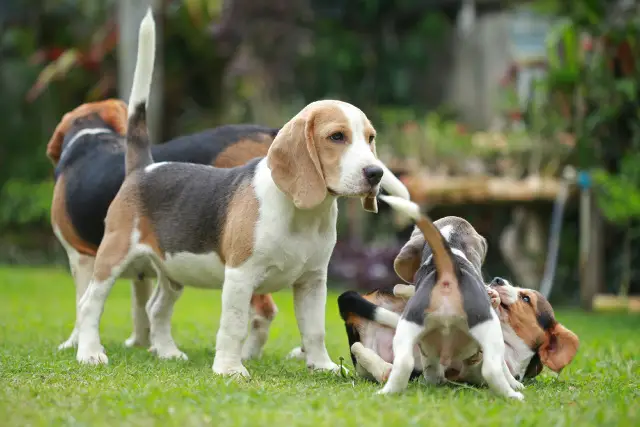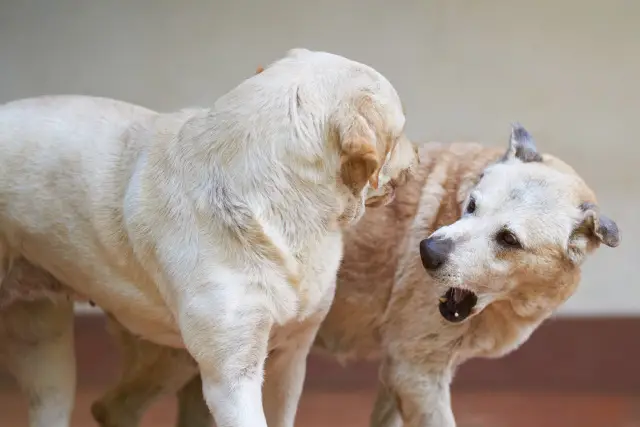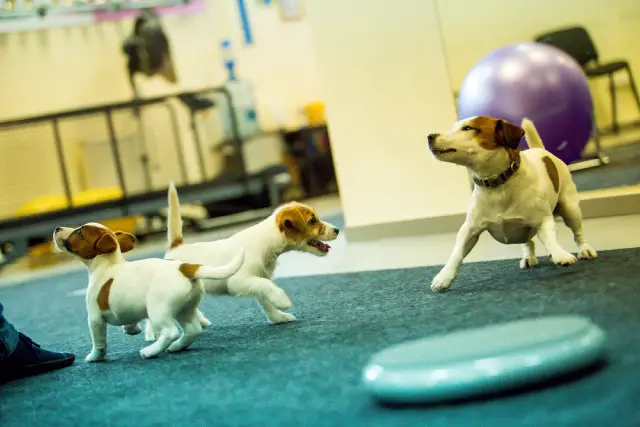Your female dog just proudly gave birth to a litter of puppies. You keep waiting for the male dog to excitedly enter the fray and begin sniffing and licking at his pups, but it doesn’t happen. You’re wondering why. Do male dogs recognize their puppies?
Male dogs do not recognize or know their puppies. The dogs lack a paternal instinct, so any instances of kindness and affection towards the puppies from a male dog are purely coincidental. Some males can even react unfavorably to puppies, becoming jealous and aggressive.
In this guide, we’ll answer all your most burning questions about how male dogs react to a new litter of puppies that they sired. By the time you’re done reading, you’ll know what to expect out of a new father pup and whether he should be separated from his puppies.

Do Male Dogs Recognize Their Puppies? Why Not?
In your eyes, it’s the perfect storybook ending. The female dog has just become a new mother and her litter is nursing. The father lingers close by, doting over his newborns. A happy family is born.
While this may be how the human family dynamic plays out a lot of the time, it’s almost never how it happens for dogs.
A male dog will not recognize his puppies, at least, more than likely, he won’t. Since dogs can’t speak to us in a language we understand, we don’t know with 100 percent certainty.
That said, prevailing male dog behavior around a new litter of puppies does seem to indicate that a male dog does not recognize his puppies.
After all, why should he? A lot of the time, when a female is giving birth, the male dog isn’t even in the room. Thus, by sight alone, a male dog wouldn’t be able to tell if those newborn puppies are his or another dog.
As for whether a dog can discern if the puppies are his by scent, that’s something we’ll talk about in the next section. Make sure you check that out!
Male Dogs and Paternal Instincts
It also doesn’t help that male dogs lack a paternal instinct.
You’ll notice that a female dog’s behavior will change as soon as she becomes a mother, as her maternal instincts are kicking in. Male dogs will not undergo any such change though.
Dogs don’t typically remain as a familial unit for long, so to the male dog, it’s just business as usual once the puppies are born.
Can a Male Dog Use Smell to Recognize Their Puppies?
Dogs have a truly incredible sense of smell that far exceeds our own as humans.
According to Phoenix Veterinary Care, the average dog has 300 million olfactory receptors. Humans, on the other hand, have only six million.
It’s more than that, though. The canine brain is also well-versed at gauging a smell. Dogs can do this about 40 times better than we humans can. If you ever see your dog get lost in a scent that you can’t pick up, that’s why!
Bearing all this in mind, you wonder how that would translate to a male dog being able to use his nose to recognize its puppies. Surely, the puppies must smell like the male dog, right? So the male would smell the same scent and determine the puppies are his, right?
Well, not exactly.
Do you know how human babies have a new baby smell? According to an article in lifestyle mag MEL Magazine, puppies have their own version of the new baby smell.
They don’t come out of the womb smelling like any one parent. As a parent spends time with the puppies, then yes, they’ll of course rub off their scent on the puppies.
However, you have to recall that male dogs are usually not in the picture when a female gives birth. Thus, if a male dog did come in to see the puppies the same day they’re born or even the next day, there’d be no sameness for the male dog to smell.
A male dog could surely smell the puppies, but there’d be no discerning smell that would ring alarm bells in the dog’s head and say, “these are my puppies.”
Do Male Dogs Love and Care for Their Puppies?
In your situation, the male dog has been in the picture. Several times, you’ve spotted him cuddling with his puppies or licking them affectionately. It’s warmed your heart so much.
Does this prove that male dogs love and care for their puppies?
While we wish we could say yes, the answer is no. Let’s go over some of the reactions that a male dog will have towards its puppies and what each means.
Affection
You’ll recall from earlier that male dogs do not have a paternal instinct. This means that, unlike female dogs, there’s nothing in the male signaling to him to raise, love, and protect his puppies.
As we’ve made clear, the male dog is probably not even aware that the puppies are his.
But what about those moments of affection between the male and his puppies? You witnessed them with your own two eyes.
It’s not that a male dog can’t be affectionate towards puppies. However, he’s not doing that because he loves the puppies or recognizes them as his own. It’s merely coincidental.
If you put this male dog in front of another set of puppies that didn’t belong to him, he might behave the same way. It simply means the male is affectionate, nothing more.
Jealousy/Aggression
Affection, even if it’s ultimately meaningless, is the best-case scenario for how a male dog can react to his puppies.
If the male dog belongs to you, or if both the male and the female dog are yours, the male will feel like he’s getting the short end of the stick right now. You’ve spent weeks giving the female dog special care as she’s prepared to give birth.
Now that the puppies are here, you’re constantly doting on them as well.
In some male dogs, this jealousy manifests in them becoming distant from the new fluffy family. Your dog can also act out, suddenly having accidents in the house, destroying furniture, or otherwise misbehaving to get your attention.
Unfortunately, the male dog can also turn aggressive towards the puppies as well as the mother.
For example, the male dog might intentionally step on the puppies, which will cause the female to attack the male to protect her pups. The two adult dogs can begin fighting.

The male can also attack the puppies or the female, even both.
Although a female dog can be weak after giving birth, she won’t stand idly by if another dog is attacking her. She’ll defend herself.
All this violence can lead to some nasty injuries for both adult dogs, which will result in expensive vet bills for you. If the puppies are hurt seriously enough, at a young age, they might not survive.
Ambivalence
In some cases, as we discussed earlier, the birth of the puppies doesn’t change the male dog’s status quo. He goes through his life as he always did, taking care to avoid the puppies and the mother.
Do Puppies Recognize Their Father?
We’ve made it quite clear by now that male dogs do not recognize their puppies as their own, but what about the flip side of the coin? Can the puppies recognize their father?
Well, when they’re born, a puppy’s senses are very much underdeveloped. They can barely see when they’re first born, although that will change in the weeks to come.
Their olfactory senses aren’t completely ready to go yet either, so a puppy doesn’t smell particularly well.
That said, several studies on the subject over the years have found that if a puppy is exposed to the scent of a parent as early as two weeks and up to eight weeks, even years later, the puppies can still use their olfactory abilities to determine a dog is their parent.
A lot of these studies were published in the 1990s. Since then, follow-up data has suggested that rather than up to a decade like some of these studies posited, the longest amount of time a dog and its parent can be separated and then reunited by smell is two years.
Also, keep in mind that all the research we’re citing on this topic pertained to a puppy being able to smell its mother, not its father. Since puppies don’t bond to their fathers the same way, it’s unlikely their scent would be imprinted as strongly.
So why can a puppy recall its mother’s scent for up to two years?
More than likely, it’s to help dogs avoid mating with their own families, which would lead to birth defects. A puppy, which would now be a fully-grown adult dog, could smell their mother and know to keep looking for a mate elsewhere.
Should a Male Dog Stay Away from His Puppies?
Have you been reading this whole time wondering why male dogs aren’t in the picture for the beginning of the puppies’ young lives? It’s no coincidence in most cases.
Since male dogs can become jealous and possibly aggressive, as the mother nears the end of her pregnancy and is about to give birth and for upwards of six weeks after that, the male dog should not be around either the mother or the puppies.
At that point, if the puppies haven’t found their furrever homes, you might wish to introduce dad and puppies. This should be a short, gradually longer process that always entails your supervision.

Conclusion
Male dogs do not recognize their puppies, and they couldn’t pick them up out of a lineup of other puppies from different litters either.
A male lacks paternal instincts, and thus, any affection towards the puppies is just a coincidence.
If anything, due to the possibly higher rate of aggression the male dog could display towards both the female and the puppies, it’s best to keep them separated until the puppies are about six weeks old.
Related Reading:
